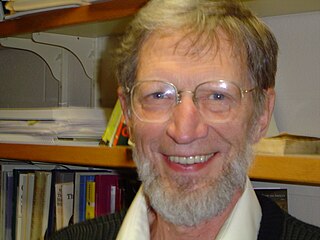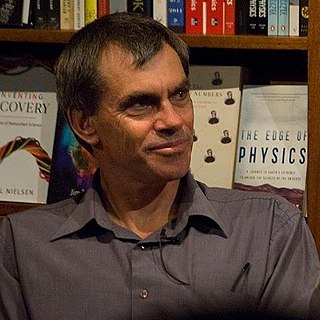Related Research Articles
The argument from morality is an argument for the existence of God. Arguments from morality tend to be based on moral normativity or moral order. Arguments from moral normativity observe some aspect of morality and argue that God is the best or only explanation for this, concluding that God must exist. Arguments from moral order are based on the asserted need for moral order to exist in the universe. They claim that, for this moral order to exist, God must exist to support it. The argument from morality is noteworthy in that one cannot evaluate the soundness of the argument without attending to almost every important philosophical issue in meta-ethics.
Philosophy of religion is "the philosophical examination of the central themes and concepts involved in religious traditions". Philosophical discussions on such topics date from ancient times, and appear in the earliest known texts concerning philosophy. The field is related to many other branches of philosophy, including metaphysics, epistemology, logic and ethics.
The problem of evil is the question of how to reconcile the existence of evil and suffering with an omnipotent, omnibenevolent, and omniscient God. There are currently differing definitions of these concepts. The best known presentation of the problem is attributed to the Greek philosopher Epicurus. It was popularized by David Hume.

Alvin Carl Plantinga is an American analytic philosopher who works primarily in the fields of philosophy of religion, epistemology, and logic.

John Leslie Mackie was an Australian philosopher. He made significant contributions to ethics, the philosophy of religion, metaphysics, and the philosophy of language.

Sir Anthony John Patrick Kenny is a British philosopher whose interests lie in the philosophy of mind, ancient and scholastic philosophy, the philosophy of religion, and the philosophy of Wittgenstein of whose literary estate he is an executor. With Peter Geach, he has made a significant contribution to analytical Thomism, a movement whose aim is to present the thought of St. Thomas Aquinas in the style of analytic philosophy. He is a former president of the British Academy and the Royal Institute of Philosophy.

William Lane Craig is an American analytic philosopher, Christian apologist, author, and Wesleyan theologian who upholds the view of Molinism and neo-Apollinarianism. He is a professor of philosophy at Houston Christian University and at the Talbot School of Theology of Biola University. Craig has updated and defended the Kalam cosmological argument for the existence of God. He has also published work where he argues in favor of the historical plausibility of the resurrection of Jesus. His study of divine aseity and Platonism culminated with his book God Over All.
The existence of God is a subject of debate in theology and the philosophy of religion. A wide variety of arguments for and against the existence of God can be categorized as logical, empirical, metaphysical, subjective or scientific. In philosophical terms, the question of the existence of God involves the disciplines of epistemology and ontology and the theory of value.
Early modern philosophy The early modern era of philosophy was a progressive movement of Western thought, exploring through theories and discourse such topics as mind and matter, is a period in the history of philosophy that overlaps with the beginning of the period known as modern philosophy. It succeeded in the medieval era of philosophy. Early modern philosophy is usually thought to have occurred between the 16th and 18th centuries, though some philosophers and historians may put this period slightly earlier. During this time, influential philosophers included Descartes, Locke, Hume, and Kant, all of whom contributed to the current understanding of philosophy.

In the philosophy of religion, Reformed epistemology is a school of philosophical thought concerning the nature of knowledge (epistemology) as it applies to religious beliefs. The central proposition of Reformed epistemology is that beliefs can be justified by more than evidence alone, contrary to the positions of evidentialism, which argues that while non-evidential belief may be beneficial, it violates some epistemic duty. Central to Reformed epistemology is the proposition that belief in God may be "properly basic" and not need to be inferred from other truths to be rationally warranted. William Lane Craig describes Reformed epistemology as "One of the most significant developments in contemporary religious epistemology ... which directly assaults the evidentialist construal of rationality."

Antony Garrard Newton Flew was an English philosopher. Belonging to the analytic and evidentialist schools of thought, Flew worked on the philosophy of religion. During the course of his career he taught philosophy at the universities of Oxford, Aberdeen, Keele, and Reading in the United Kingdom, and at York University in Toronto, Canada.

In monotheistic belief systems, God is usually viewed as the supreme being, creator, and principal object of faith. In polytheistic belief systems, a god is "a spirit or being believed to have created, or for controlling some part of the universe or life, for which such a deity is often worshipped". Belief in the existence of at least one god is called theism.

Graham Robert Oppy is an Australian philosopher whose main area of research is the philosophy of religion. He is Professor of Philosophy and Associate Dean of Research at Monash University, CEO of the Australasian Association of Philosophy, Chief Editor of the Australasian Philosophical Review, Associate Editor of the Australasian Journal of Philosophy, and is on the editorial boards of Philo, Philosopher's Compass, Religious Studies, and Sophia. He was elected Fellow of the Australian Academy of the Humanities in 2009. Graham Oppy is widely considered by some philosophers to be the most formidable defender of Atheism living today.
Nick Trakakis is an Australian philosopher who is Assistant Director of the Centre for Philosophy and Phenomenology of Religion of the Australian Catholic University. He has previously taught at Monash University and Deakin University, and during 2006–2007 he was a postdoctoral research fellow at the Centre for Philosophy of Religion at the University of Notre Dame. He works mainly at the intersections of philosophy, religion, and theology.

Philosophy is a systematic study of general and fundamental questions concerning topics like existence, reason, knowledge, value, mind, and language. It is a rational and critical inquiry that reflects on its own methods and assumptions.
Atheism, in the broadest sense, is an absence of belief in the existence of deities. Less broadly, atheism is a rejection of the belief that any deities exist. In an even narrower sense, atheism is specifically the position that there are no deities. Atheism is contrasted with theism, which in its most general form is the belief that at least one deity exists.
Agnostic atheism or atheistic agnosticism is a philosophical position that encompasses both atheism and agnosticism. Agnostic atheists are atheistic because they do not hold a belief in the existence of any deity and are agnostic because they claim that the existence of a divine entity or entities is either unknowable in principle or currently unknown in fact.
The term New Atheism describes the positions of some atheist academics, writers, scientists, and philosophers of the 20th and 21st centuries. New Atheism advocates the view that superstition, religion, and irrationalism should not simply be tolerated. Instead, they advocate the antitheist view that the various forms of theism should be criticised, countered, examined, and challenged by rational argument, especially when they exert strong influence on the broader society, such as in government, education, and politics. Major figures of New Atheism include Richard Dawkins, Sam Harris, Christopher Hitchens and Daniel Dennett, collectively referred to as the "four horsemen" of the movement, as well as Ayaan Hirsi Ali until her conversion to Christianity in 2023.
The Copleston–Russell debate is an exchange concerning the existence of God between Frederick Copleston and Bertrand Russell broadcast on the BBC Third Programme on 28 January 1948 and again in April 1959. The debate centers on two points: the metaphysical and moral arguments for the existence of God. According to Graham Oppy and Nick Trakakis, the arguments used in this debate would typify the arguments presented by theists and atheists in the latter half of the 20th century, with Russell's approach often being used by atheists in the late 20th century.
References
- 1 2 3 "Nick Everitt's Homepage". Retrieved 12 February 2021.
- ↑ Rice, Hugh (2005). "Reviewed Work: The Non-Existence of God by Nicholas Everitt". The Philosophical Quarterly . 55 (221): 692–693.
- 1 2 3 Davison, Scott A. (2007). "Reviewed Work: The Non-Existence of God by Nicholas Everitt". International Journal for Philosophy of Religion. 61 (2): 127–129. doi:10.1007/s11153-007-9116-y. S2CID 170168758.
- ↑ "The Non-Existence of God". Routledge. Retrieved 12 February 2021.
- 1 2 Tiller, Glenn (2006). "The Non-Existence of God by Nicholas Everitt". Dialogue: Canadian Philosophical Review . 45 (4): 777–779. doi:10.1017/S0012217300001335. S2CID 170979670.
- ↑ "The Non-Existence of God: An Introduction". Internet Infidels. Retrieved 12 February 2021.
- ↑ "Reasoning Away God". New Humanist. Retrieved 12 February 2021.